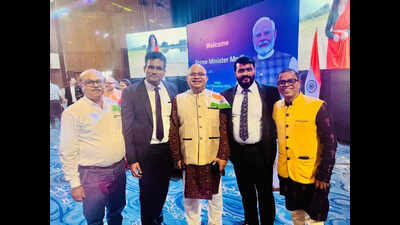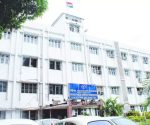Indians in Nigeria Look Forward to Enhanced Trade Relations Following PM Modi’s Historic Visit | Bhubaneswar News


Bhubaneswar: Prime Minister Narendra Modi’s recent visit to Nigeria and being conferred with Grand Commander of the Order of the Niger (GCON), its second-highest national honour, has kindled hopes among the Indian diaspora of better bilateral and trade ties between the two countries.
PM Modi is the second foreign leader after Queen Elizabeth to receive the honour.
“The long-awaited visit galvanised the entire ecosystem with the Nigerian media covering it well,” said Anant Sabat, an entrepreneur and former general secretary of the Odia Samaj Association of Nigeria (OSAN).
Indians living in the West African nation expect a sharp rise in bilateral trade, particularly in defence, finance, power, steel, pharmaceuticals, oil and gas after PM Modi’s visit. “India already has a significant presence, and the PM’s visit will boost it further,” said Himanshu Mohapatra, former president of OSAN.
Most Indians living in Nigeria want the govt to do away with the resident permit under which they have to pay $2,000 annually to stay in that country. “There were talks to increase the amount to $10,000. If it happens, it will become very difficult for many Indians living in Nigeria,” said Ramesh Mallick, president of OSAN.
“While $2,000 is for a couple and their children, the amount must be paid separately once the kids become adults,” said Mallick. The Indian community also wants a cheaper visa fee and a direct flight from India, either from Mumbai or New Delhi. “We hope these demands become a reality after the PM’s visit,” said Sabat.
For NRIs, securing foreign currency (especially US dollars) to send back remittances and trade for Indian business houses is a challenge because of high demand and low availability of dollars. “Making the Indian rupee acceptable in Nigeria will support the community in a long way, and the taxation treaty is also long overdue,” he said.
“Besides, Indians don’t want to be taxed on foreign earnings and seek the removal of Nigeria from India’s list of high-risk countries,” said Bachu Ravi from Balasore, chief finance officer in an oil and gas company.
Around 1,200 Indians joined the programme during Modi’s visit, with the Indian High Commission issuing a unique identification number to each for security reasons. Fifty people each received him at the airport and saw him off, 100 people welcomed him in the Abuja hotel, while 1,000 were allowed at his meeting.
“There are a lot of employment opportunities in Nigeria in healthcare, defence, food and agriculture sectors. Indians can tap into these fields,” said Sangram Pattnaik, general manager (commercial) in an Israeli company in Nigeria.
Many Indians were disappointed as they could not travel to Abuja because of less flights. They wanted Modi to visit Lagos because it is home to 80% of Indians living in Nigeria.















